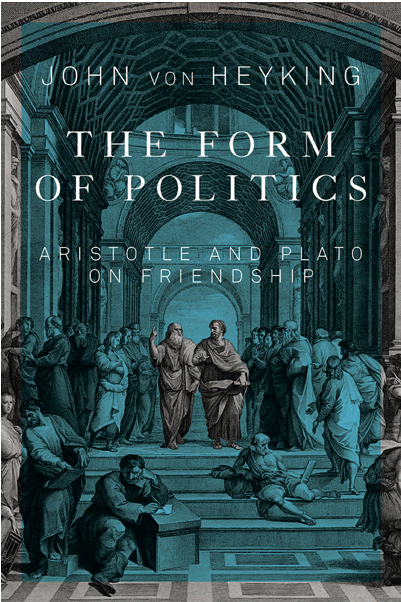The genesis of a book project can come from anywhere and in the case of Dr. John von Heyking’s latest publication, The Form of Politics, it was spawned by a simple class discussion.

“The germ of it came when I was doing a reading group with some undergraduate students,” says von Heyking, a professor in the University of Lethbridge’s Department of Political Science. “We were discussing Greek political thought on friendship and at one point I put down my glasses and said, ‘There’s nothing else that’s worth talking about in politics. This is where the action is, everything else leads to this’. The intervening years have filled out that insight.”
The book considers the writings of Aristotle and Plato and examines the role that friendship plays in the political arena. It’s a concept von Heyking admits gives many people pause for thought, especially in the context of today’s divisive political landscape.
“People sometimes look at me weirdly when they find out I’m writing about politics and friendship but the more I got into it, the more I came to realize how important friendship is for people who are practically engaged in politics,” he says. “It does exist today but I’ll admit, it’s pretty frayed, and there are a lot of things that inhibit it. Political friendship is predicated on the willingness of people to deliberate together, and that means face-to-face. Of course it’s going to get heated because there is a lot at stake but as long as people are arguing, that’s a sign of health. When they stop arguing is when the trouble starts.”

Von Heyking says the writings of the great Greek philosophers have been studied for centuries but he still finds relevance in their lessons.
“There’s a kind of symmetry between what the philosophers are saying and what people actually do in politics,” he says. “What the book does is lay the roadmap for what it means for friendship to be a central category of statecraft, in terms of citizenship and in terms of the effective ties that bind together a society.”
He makes reference to great statesmen of history, Winston Churchill and Abraham Lincoln, as examples of politicians who practiced these principles throughout their political lives. Von Heyking has also examined multiple Canadian politicians and the ties of friendship that bound them together, despite their opposing political beliefs.
“I would argue that even if one of us is liberal, the other conservative, we don’t have to be best friends, but if we don’t have an experience of deep-seated, morally-serious friendships at some point in our lives, then it is harder for us to view each other as persons with unique histories,” he says.
Pointing to the widening gulf of understanding between American politicians, von Heyking says a concerted effort has been made in recent history to limit fraternization between opposing members of Congress, which has led to a deteriorating sense of understanding.
“The congressional schedule was changed in the 1990s that obliged members to spend more time with their constituencies. While serving that purpose, it also made it far more difficult for members to socialize with one another,” he says. “The problem with that is, you tend not to see the ‘other side’ as people anymore. It’s hard to demonize somebody whose kids go to school with and play with your kids but that doesn’t happen anymore.”
While von Heyking is the first to defend political debate, he argues that it must come from a shared experience.
“Partisan differences are fine, you must have diversity of opinions and interests, but the trick is how you weave them together. Finding institutions and forums for common deliberations is important,” he says.
Now that the book is out, von Heyking is already on to his next project, which ironically came from writing the introduction to The Form of Politics. Using Churchill and Lincoln as examples to illustrate the timelessness of the writings of Aristotle and Plato, he quickly realized a paragraph or two couldn’t fully explore the significance of this connection. Therefore, Churchill is the focus of his next manuscript.
“When it comes to political philosophy and thinking about friendship, the thing I found is that you have to understand everything you can about these thinkers in order to understand what they are saying about friendship,” he says. “For them, friendship is kind of the pinnacle of one’s moral life, it is what it means to be a human being.”
The Form of Politics is available through McGill-Queen’s University Press in cloth, paperback and eBook formats.
